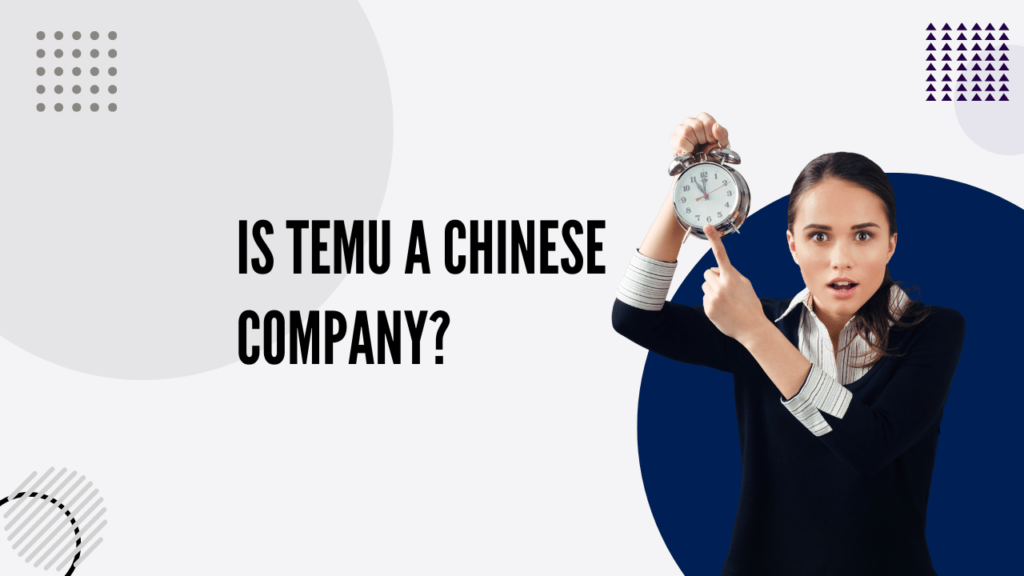Is Temu a Chinese Company? In the ever-evolving landscape of e-commerce, a new player has emerged, capturing the attention of consumers and industry experts alike. Temu, a rapidly growing online shopping platform, has taken the world by storm with its enticing product offerings and unbeatable prices.
However, amidst the excitement surrounding this newcomer, questions have arisen regarding its origins and ownership structure. Is Temu a Chinese company, or is there more to the story? This comprehensive article delves into the complexities surrounding this query, exploring the available information and shedding light on the enigmatic nature of this e-commerce giant.
The Rise of Temu: From Obscurity to Prominence
Temu burst onto the scene in 2022, quickly establishing itself as a force to be reckoned with in the online shopping realm. With its vast array of products spanning multiple categories, including electronics, fashion, home goods, and more, Temu has captured the imaginations of bargain hunters worldwide. The platform’s allure lies in its promise of rock-bottom prices, often undercutting even the most formidable competitors.
The company’s meteoric rise has been nothing short of remarkable, with its mobile application skyrocketing to the top of the charts in various app stores. Temu’s aggressive marketing campaigns, coupled with its seemingly irresistible deals, have propelled it to the forefront of the e-commerce landscape, leaving many established players scrambling to keep up.
Temu’s Origins: Unraveling the Corporate Veil

Tracing the origins of Temu has proven to be a complex endeavor, shrouded in ambiguity and conflicting information. On the surface, Temu presents itself as a Massachusetts-based company, with its corporate headquarters listed in Boston. However, digging deeper reveals a tangled web of connections that potentially link the platform to Chinese entities.
According to reports, Temu is owned by a company called Nasdaq-listed PDD Holdings Inc., which is headquartered in Shanghai, China. PDD Holdings Inc., formerly known as Pinduoduo Inc., is a renowned Chinese e-commerce platform that has amassed a significant user base within the Chinese market.
The Chinese Connection: Exploring PDD Holdings Inc.
PDD Holdings Inc., the alleged parent company of Temu, is a formidable player in the Chinese e-commerce landscape. Founded in 2015, the company has rapidly expanded its footprint, leveraging innovative business models and social e-commerce strategies to capture a substantial market share.
One of PDD Holdings Inc.’s hallmarks is its emphasis on group buying and gamification, which has proven to be a highly successful approach in engaging consumers and driving sales. The company’s core platform, Pinduoduo, has amassed a staggering user base, with millions of active buyers and sellers participating in its unique e-commerce ecosystem.
While PDD Holdings Inc. has undoubtedly achieved remarkable success in China, its foray into the global market through Temu has raised eyebrows and sparked discussions about potential implications.
Data Privacy and Security Concerns
As with any e-commerce platform, data privacy and security are paramount considerations for Temu’s users. Given the alleged Chinese connections, concerns have been raised regarding the potential risks associated with sharing personal and financial information with the platform.
Critics have voiced apprehensions about the possibility of data being accessed or exploited by Chinese entities, particularly in light of the ongoing tensions between China and various Western nations over issues such as cybersecurity and intellectual property rights.
It is crucial to note that Temu has not been implicated in any data breaches or mishandling of user information to date. However, the lack of transparency surrounding the company’s ownership structure and potential ties to Chinese entities has fueled skepticism and heightened scrutiny from privacy advocates and regulatory bodies.
Regulatory Scrutiny and Geopolitical Implications

The ambiguity surrounding Temu’s ownership has not gone unnoticed by regulatory authorities and governments worldwide. As the platform continues to expand its reach, concerns have been raised about the potential geopolitical implications of a Chinese-owned e-commerce giant operating in foreign markets.
In the United States, lawmakers and policymakers have expressed reservations about the potential risks posed by Chinese companies operating in sensitive sectors, including technology and e-commerce. The ongoing trade tensions between the U.S. and China have further exacerbated these concerns, leading to increased scrutiny of Chinese investments and acquisitions in American companies.
Similar apprehensions have been voiced in other regions, such as Europe and Australia, where governments have implemented measures to safeguard critical infrastructure and industries from potential foreign interference or exploitation.
Temu’s Response and Transparency Efforts
In the face of mounting scrutiny and speculation, Temu has attempted to address concerns about its ownership and operations. The company has consistently maintained that it is a U.S.-based entity, with no direct ties to the Chinese government or state-owned enterprises.
Temu’s executives have emphasized the platform’s commitment to data privacy and security, asserting that user information is handled in accordance with industry best practices and applicable laws and regulations. Additionally, the company has stated that its operations are subject to oversight and auditing by relevant authorities in the jurisdictions where it operates.
However, despite these assurances, the lack of transparency surrounding Temu’s ultimate ownership structure and potential connections to Chinese entities continues to fuel skepticism and ongoing debates.
The Future of Temu: Navigating Challenges and Opportunities
As Temu continues to navigate the choppy waters of the global e-commerce market, it faces both significant challenges and promising opportunities. The platform’s ability to address concerns about its ownership and allay fears surrounding data privacy and security will be crucial in determining its long-term success and acceptance.
One potential path forward for Temu could involve increased transparency and cooperation with regulatory bodies. By proactively addressing concerns and demonstrating a willingness to comply with relevant laws and regulations, the company may be able to alleviate some of the skepticism surrounding its operations.
Additionally, Temu could explore partnerships or collaborations with established Western companies or organizations, leveraging their expertise and credibility to build trust among consumers and stakeholders.
Alternatively, if the concerns surrounding Temu’s potential Chinese connections prove insurmountable, the company may need to reevaluate its global expansion strategy. This could involve restructuring its ownership or operations to distance itself from any perceived ties to Chinese entities, or potentially shifting its focus to markets where such concerns are less prevalent.
Conclusion
The question of whether Temu is a Chinese company or not remains a complex and multifaceted issue. While the platform presents itself as a U.S.-based entity, the alleged connections to Chinese parent company PDD Holdings Inc. have raised eyebrows and fueled ongoing debates.
As Temu navigates the challenges posed by regulatory scrutiny, data privacy concerns, and geopolitical tensions, its ability to address these issues transparently and effectively will be critical to its long-term success. Ultimately, the platform’s future will be shaped by its ability to build trust among consumers, stakeholders, and regulatory bodies, regardless of its ultimate ownership structure.
In the rapidly evolving landscape of e-commerce, where consumer trust and confidence are paramount, Temu’s journey serves as a reminder of the complexities inherent in the global marketplace. As the world becomes increasingly interconnected, the lines between domestic and international entities continue to blur, underscoring the need for vigilance, transparency, and a commitment to upholding ethical and legal standards.
Whether Temu emerges as a trailblazer or a cautionary tale in the annals of e-commerce history remains to be seen. However, one thing is certain: the scrutiny surrounding its alleged Chinese connections has brought to the fore crucial discussions about data privacy, cybersecurity, and the intricate interplay between business, technology, and geopolitics in the 21st century.
FAQs
What is Temu?
Temu is a rapidly growing online shopping platform that offers a vast array of products at significantly discounted prices. It has gained immense popularity among bargain hunters worldwide due to its enticing deals and aggressive marketing campaigns.
Where is Temu headquartered?
According to official information, Temu is based in Boston, Massachusetts, with its corporate headquarters listed in the United States.
Who owns Temu?
While Temu presents itself as a U.S.-based company, reports suggest that it is owned by PDD Holdings Inc., formerly known as Pinduoduo Inc., a prominent Chinese e-commerce platform headquartered in Shanghai, China.
Does Temu have ties to the Chinese government or state-owned enterprises?
Temu has denied any direct ties to the Chinese government or state-owned enterprises. However, the alleged connection to Chinese parent company PDD Holdings Inc. has raised concerns about potential risks and implications.
What are the concerns surrounding Temu’s potential Chinese connections?
The main concerns revolve around data privacy and security, as well as potential geopolitical implications. Critics have voiced apprehensions about the possibility of user data being accessed or exploited by Chinese entities, given the ongoing tensions between China and various Western nations.
Has Temu been implicated in any data breaches or mishandling of user information?
As of now, there have been no reported instances of Temu being involved in data breaches or mishandling of user information. However, the lack of transparency surrounding the company’s ownership structure has fueled skepticism and heightened scrutiny.
What steps has Temu taken to address concerns about data privacy and security?
Temu has emphasized its commitment to data privacy and security, asserting that user information is handled in accordance with industry best practices and applicable laws and regulations. The company has also stated that its operations are subject to oversight and auditing by relevant authorities.
How have regulatory authorities responded to Temu’s operations?
Regulatory authorities and governments worldwide have expressed concerns about the potential risks posed by Chinese companies operating in sensitive sectors, such as technology and e-commerce. Increased scrutiny and measures have been implemented to safeguard critical infrastructure and industries from potential foreign interference or exploitation.
What challenges does Temu face in navigating the global e-commerce market?
Temu faces significant challenges in addressing concerns about its ownership, data privacy and security, and potential geopolitical implications. Building trust among consumers, stakeholders, and regulatory bodies will be crucial for its long-term success and acceptance in various markets.
What is the future outlook for Temu?
The future of Temu remains uncertain and will depend on its ability to navigate the challenges posed by regulatory scrutiny, data privacy concerns, and geopolitical tensions. Increased transparency, cooperation with regulatory bodies, and potential restructuring or partnerships may be necessary for the company to achieve long-term success in the global e-commerce market.







